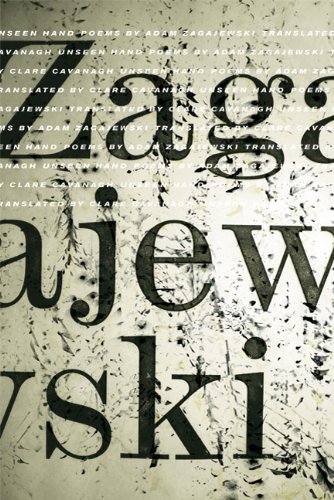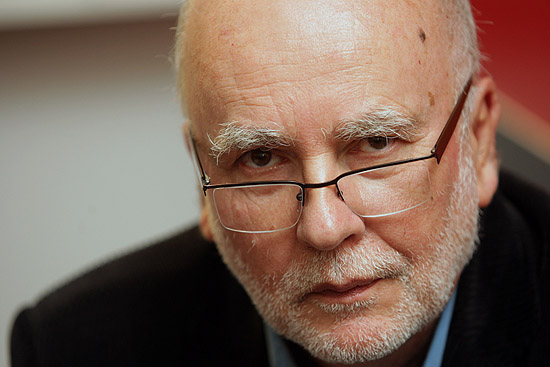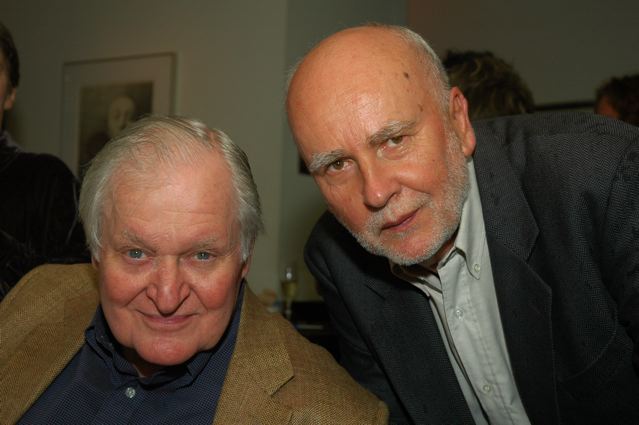Poetry Review: Zagajewski 6.0
If the verse in Unseen Hand refuses triumphant fictions, there is an attentive, persevering dignity in its preference for seriality. Because these recurring poems recreate our being in the world, they are powerful tools for returning to it.
 Unseen Hand by Adam Zagajewski. Translated from the Polish by Clare Cavanagh, Farrar Straus Giroux, $23.
Unseen Hand by Adam Zagajewski. Translated from the Polish by Clare Cavanagh, Farrar Straus Giroux, $23.
Originally published as Niewidzialna ręka by Znak Publishers, Poland
By Daniel Bosch.
I.
Born in Lvov, Poland, in 1945—the end of one trauma, the beginning of another—Adam Zagajewski is one of a handful of poets who have maintained, during their exiles in the United States, a less mercenary, more contemplative than “professional” aesthetic. Sixty or 70 years ago, Auden and Nabokov set their very different examples; in the more recent past, Czesław Milosz, Joseph Brodsky, Seamus Heaney, Eavan Boland, Derek Walcott, and Paul Muldoon have lived and written among us and taken stipends and salaries from our creative writing programs.
Whatever exile here cost these poets, whatever exile here gave them, their speaking quietly and clearly and their writing so beautifully against the American grain has been salutary, for they are like us, and they like us, but they refuse to relinquish their difference. Friends of mine who have studied with Zagajewski talk about literature as if it’s still breathing, and they do not talk about having a career.
Prominent American professors of creative writing who spent time with Brodsky raised their sights and began to try to write literature—and learned from how they failed to do so. Indeed, a famous photo postcard shows a beaming Mark Strand besides Brodsky, Zagajewski, and Walcott outside Brodsky’s New York City apartment, and one can date Strand’s slow turn away from trying to write (and to compete with other practitioners of) American verse to this period. But even if nobody on this side of the Atlantic were listening to them, the presence of such poet-exiles has been as necessary as control rods in a nuclear reactor.
II.
The most common template for a manuscript of poems assembled in America since 1970 is the tri-partite—three sections divided by numerals. (This template is even more commonly used in individual poems.) Associated with every conceivable kind of American poetry, if it were once thought to be a sign of some sort of intellectual rigor, it now signifies rigor mortis. Yet the tri-partite may be the perfect structure for the poetry of the American empire: it is said to embody an arc legible as “progress,” and when Roman numerals are used to mark its three sections, each underscores the destiny of a self-interested “I” whose purchases make manifest the guidance of an unseen hand.
Whatever his time in America has cost him or given him, Zagajewski has had a chance to think through the tri-partite template. The 67 poems of Unseen Hand are divided into three Roman-numeral-divided sections, and the first section’s 22 poems establish the emotional and thematic boundaries of the whole. The realm of Unseen Hand is memory, and its principal attendant is longing. Zagajewski’s mode is catalogical. Sometimes heavily-modified, concrete nouns are linked in chains and affixed to anchors of life: prodding of long-healed childhood wounds, witnessing the aging of one’s parents, revisiting the past in reality and in photographs, the Old World calling to one living in the New.
Many of the poems are subtitled in a companionable way: if a title suppresses the name of a poem’s dedicatee (“K.I.G.”), Zagajewski immediately gives that name away (“Galczynski, Of Course”); or if it names a broad human predicament (“Piano Lesson”), Zagajewski quickly locates it in a specific emotional register “I’m Eight Years Old.”) Maybe he also used such subtitles in the Polish edition of Unseen Hand, but in the context of the English translation, the gesture acknowledges Zagajewski’s difference from us and his confidence that he can help us to understand where he is coming from; the Zagajewski of Unseen Hand is here to engage shared struggles, not to play hide and seek with meaning.
But the most important strategy in Unseen Hand is a trope of likeness. Zagajewski has no truck with American fictions of “progress.” Here poems are really like other poems, the ones in the previous sections, say, just 15 pages back. The second and third sections of Unseen Hand (25 poems in section II and 20 poems in section III) deliberately return to the poems and themes of the first section, deliberately writing them over and explicitly taking on the same impulses. Yet as you will see the subsequent poems are separate poems—the first section is not full of drafts that are revised by the second section and then the third.
Nor is this experience of reading, which is so close to re-reading, to be compared to how we read pentimenti in a painting. The texture developed by this likeness of poems in Unseen Hand is too rich to detail here, but the following table may give you some idea of how Zagajewski has revised the tri-partite template:
• “Vita Contemplativa” (I) becomes “Also Vita Contemplativa” (II)
• “On Walking with My Father” (I) becomes “Now that You’ve Lost Your Memory” (II) becomes “The Green Windbreaker” (III) becomes “My Father No Longer Knows Me” (III)
• “Piano Lesson” (I) becomes “Piano Tuner” (II)
• “Joseph Street in Winter” (I) becomes “Joseph Street” (II)
• “The Lovely Garonne” (I) becomes “And the Lovely Garonne” (II) becomes “Impassive” (II) becomes “In Valleys” (III)
• “Self-Portrait in Airplane” (I) becomes “Self-Portrait in a Little Museum” (II) becomes “Self-Portrait” (III), all of which have a lot to do with “Paintings” (III)
So Zagajewski 6.0 comes with free, automatic updates: you read a poem, and you read on to discover that Zagajewski has refreshed the page, renewed its software (and yours) with slightly improved capacities that are still vulnerable to human error. If Unseen Hand refuses triumphant fictions, there is an attentive, persevering dignity in its preference for seriality. Because these recurring poems recreate our being in the world, they are powerful tools for returning to it. This is not the same trope of likeness that John Ashbery exploits by writing the one long poem he’s been at for 35 years.
Zagajewski’s play with different stanzas and measures and dramatic sites infuses Unseen Hand with creative energy very different from Ashbery’s super-human volubility and redundancy. It was not within the imaginative capacity of an American poet to come up with such a fix for a moribund structure, to fix it by fixation, to acknowledge, in it, the fix we are in.
New versions of Microsoft Office are not going to stop coming, and we are not going to get better at being human. Yet in its way Unseen Hand restores and refreshes the tradition of lyric song-making and moral intelligence from which it draws its strength.
III.
When we evaluate metaphors and similes without getting too philosophical about them, they have to pass the fish test: we examine them carefully, from lip to tailfin, we sniff them, and we poke them to determine if they are “fresh.” Always part of the power of poems to delight readers, the freshness of a poet’s “fish” has for at least a hundred years been a central criterion in the evaluation of their accomplishment. If the coloring is true and nothing smells of Denmark, we also make a close examination of the figure’s eyeball. If it’s cloudy—if we cannot “see” the elements of the imagery that comprises the likeness—it’s not fit for the table or the page. (A classic article in this vein of practical criticism is Donald Hall’s “Hall’s Index,” a catalog of necrosis that explains, in part, why so many pieces of verse decompose so soon after composition.)
But what human critic can afford to look through an entire book of poems and to isolate the likeness tropes? Well, today, thanks to the miracle of Similike ™ technology, downloadable for free as an iPhone app, any reader of poetry can quickly locate, archive, analyze, and evaluate similes in poetic texts from all the major alphabetic languages. (Similike ™ uses “like” and “unlike” tags, of course.) I’ve been test-driving Similike ™ for the manufacturer. So go ahead, ask me about Zagajewski’s Unseen Hand. How fresh are his fish?
Similike ™ finds 44 similes in the 67 poems in Unseen Hand (46 if you count “revised” similes, in which the initial term B of the comparison “A is like B” is rejected and replaced or revised by the speaker with a new term in one continuous gesture.) Similike ™ indexed all 46 similes, in order of their occurrence, and I’ve archived them here (see Appendix One). Below are 12 different fish, each followed by the title of the poem in which it occurs.
A plane rose from the airport
like a zealous pupil who believes
what the old masters told him.
“Café”
•
. . . the sun, like a worried first-grader,
diligently colors in the shadows.
“Family Home”
•
And in the quiet bats like Ionian philosophers
make sudden, radical decisions in mid-flight,
filling us with admiration.
“Mute City”
•
Summer cried loudly like vegetable sellers
In Parisian markets.
“June in Siena”
•
. . . time sways on the meadows
like happy schoolboys playing hookey.
“And the Lovely Garonne”
•
Bicycles chat familiarly, like deaf-mutes.
“Ravenna”
•
At intermission a man in a corduroy jacket
emerges from backstage, lays his hands on the piano like
an experienced obstetrician and vanishes, while the heedless
audience breathes deeply.
“Piano Tuner”
•
white houses, and cars
as clean as a bureaucrat’s conscience;
“Wandering”
•
A kingfisher made its entrance like a Hollywood star.
“Silhouettes”
•
. . . imagination, like a solitary climber,
battles daily with the force of gravity.
“The Rhone Valley”
•
Poets, invisible like miners,
hidden in the shafts,
build a home for us:
“Cloud”
•
And the lovely Garonne, which passes
through drowsy villages each night
like a priest with the last sacrament.
“In Valleys”
Similike ™ tells me that in each of these 12 examples, Zagajewski has chosen to connect the familiar or “A” term to an unfamiliar “B” term that is a kind of person (“pupil,” “first-grader,” “philosopher,” “vegetable sellers,” “schoolboys playing hookey,” “deaf-mutes,” “experienced obstetrician,” “bureaucrat,” “Hollywood star,” “solitary climber,” “miners,” and “priest.”) Each of these similes, in Zagajewski’s phrase, “battle(s) with the force of gravity”; language itself is personified by Zagajewski’s work to discover such startling likenesses.
What is the sun like? How do bats move? The river? What are its offices like? And what about that dusty, mud-spattered coupe—what does its surface remind you of? Again and again Zagajewski likens objects in the world to human beings, a move that, in a delicious paradox, reinforces our human difference from mere objects, which cannot battle gravity as we can, with human play, with levity.

Adam Zagajewski — a deep skepticism about any philosophizing for its own sake, a distaste for the generation of language that would disconnect us from embodied human experience.
The clarity of the eye of these similes amazes: bikes, chained to their racks, lean into each other, handlebars and pedals gesticulating, baskets like bellies touching, each headlamp bent to an ear. The marvel of a jet’s steep ascent is precisely as vertiginous and self-deafening as a commencement of a confident—not to say naïve—pupil who believes she’s leaving her teachers behind (because that’s what they told her!) A blazing sun does sometimes lean its cheek into the coloring book page of the earth such that—quite impossibly—the shade it draws is darkened. And the piano tuner does arrive at intermission to touch the pregnant instrument in a way the pianist doesn’t. (This trope extends a deep respect to all the parties to the birth of a child: mother, midwife, doctor, and “audience” (father, life-partner, family). Similike ™ allows users to “unlike” similes and metaphors if they so choose. But Zagajewski is so good at forging relations between to things, and between things and people, that it is impossible to “unliken” them.
To insist here on a practical critic’s approach to Unseen Hand is not to imply that Zagajewski’s latest work will not bear philosophical scrutiny. But I read in Zagajewski 6.0 a deep skepticism about any philosophizing for its own sake, a distaste for the generation of language that would disconnect us from embodied human experience, what that’s like. In “The Great Poet Has Gone,” Zagajewski’s subtitle is “Thinking of C.M.”, enough to let even an American understand he means Czesław Milosz.
Of course nothing changes
in the ordinary light of day,
when the great poet has gone.
Gray sparrows and dapper starlings
still squabble heatedly
In the tops of ancient elms.
When the great poet has gone,
the city doesn’t miss a beat, the metro
and the trams still seek a modern Grail.
In the library a lovely girl
looks in vain for a poem that could explain it all.
This modest elegy is simply-phrased, but complex. Clare Cavanagh’s translation of the last three lines above evinces a joy in the musicality of verse that runs counter to the depth of the poem’s explicit grief. (It’s a little “Lycidas” in this way.) Cavanagh’s slant-rhymes (“Grail,” “girl,” and “all”) are perfectly pitched, yet the silences in this poem are as terrible as those in Chopin. Even in its short span, “The Great Poet Is Gone” finds space to seethe: “Soon the discotheques will open, // indifference will open—”. When we lose someone we have loved, being mature, having read a great deal, none of the trappings of intellect and rationality are sufficient. It is especially moving that it is Adam Zagajewski who writes so plainly of the terror one feels when one realizes “we must speak for ourselves now // there’s no one to do it for us.”
“Metaphor” also abjures the consolations of philosophy. Its speaker recalls a “very old poet” whom Zagajewski’s overheard doing what poets do best, telling a lie: “Every metaphor is a failure.”
Consider the source! The declaration of “the very old poet” is so blatant it begs the question. But Zagajewski’s speaker doesn’t call him on his lie. Instead he drops from the poem, listens, and records, trusting that any master of metaphor will correct himself and choose human truth over academic. With such a lie, Wisdom—“a very old poet”—has placed an ice cube on the stove, and, to borrow a successful metaphor from Frost, if Wisdom would make a poem, it must ride on its own melting. In a matter of lines, “the very old poet” leaves philosophy for more grounded truth. In their failings, says he, tropes of likeness engage us in fictional narratives—they beg the quest. When we are “moved” by metaphors and similes, we leave point A and follow the trope. Waxing, wine-dark goblet in hand, “the very old poet” had insisted that no arrival at any point B could satisfy our longings, but by the end of “Metaphor,” he’s acknowledged that
the things we love, the unseen things,
take flesh, of course, in what can
be seen and said, though never
absolutely, one to one…
…there’s always a little too much
or a little too little, the seams remain on the surface,
fingers jut, buttons, umbrellas, fingernails…
uncollected letters in azure airmail envelopes,
the sense of shortfall or excess remains…
…but just wait
thanks to this, thanks to this incongruity,
thanks to this inexplicable rupture,
we may keep chasing the chimera of metaphor,
all our lives we walk in darkness,
in a dim forest, we track the trail of simile,
imperfect, just like my speech, just now reaching
its conclusion, although there is
no doubt much more to add,
but I fear that I’m already
growing weary and seem
to hear sleep calling.
Philosophy has yielded, the ice has melted (we saw it become a pool of water and then disappear into vapor), but we have also read a poem, a made thing that exceeds our given predicaments. “Metaphor” reminds us that we have so often heard “imperfect” tropes that we are brazed to them. Terra imperfecta it may be, but in practice—as in practical criticism—language passes for solid ground. (If it takes a Pole to tell this to Americans, that’s because Poles know about “change”.) Every day we stand on this ground, just beyond the extent of the reach of philosophy, and if we are lucky, on many of those days we stand in awe of how a poet’s words have made the world fresh again.
By the way, I lied about Similike ™. There is no technological short-cut that can help us read poems, and no start-up in Silicon Valley is on the verge of an Initial Poetic Offering. The best we can do is to follow the Unseen Hand.
SIMILES IN UNSEEN HAND BY ADAM ZAGAJEWSKI
A plane rose from the airport
like a zealous pupil who believes
what the old masters told him.
“Café”
•
A piano stands in the room
like a lazy, tamed predator—
“Piano Lesson”
•
You come here like a stranger,
but this is your family home.
The currants, the apple and cherry trees don’t know you.
One noble tree readies
a new brood of walnuts in peace,
while the sun, like a worried first-grader,
diligently colors in the shadows.
“Family Home”
•
And in the quiet bats like Ionian philosophers
make sudden, radical decisions in mid-flight,
filling us with admiration.
“Mute City”
•
Crouched like an embryo,
crushed into the narrow seat,
I try to remember
the scent of fresh-cut hay
when wooden carts descend
in August from the mountain meadows…
“Self-Portrait in an Airplane”
•
Summer cried loudly like vegetable sellers
In Parisian markets…
And
. . . on every small square the boys
practiced their kettledrums before the Palio—
the brown city quivered like troops before battle.
“June in Siena”
•
When father hiked through the mountains, tireless,
patient, sometimes for hours in the rain,
under his cape, like bygone pilgrims
trudging towards Spain, I thought
that yes, of course, he’d cross the mild slopes
and come one day to the other side…
“When Father Hiked”
•
The weather was lovely, rain like diamonds,
women in summer dresses, children as always
slightly peeved, peaches on tabletops.
“The Revolution has Ended”
•
At night, the lightbulbs hiss like signals of sinking ships.
“Lost”
•
The streams tell it about storms
and about completely quiet, peaceful days,
when time sways on the meadows
like happy schoolboys playing hookey.
And
Above it a rosy city rises—at night
it turns gray like the eyes of vagrants.
“And the Lovely Garonne”
•
The wheels in mining towers whirled
like carousels in fairgrounds.
“The Last Stop”
•
. . . I want to help you—it was you,
after all, who opened my imagination like a demiurge.
And
. . . we scaled the heights
of a lighthouse above the Baltic
and we watched the endless rippling of the sea,
its white stitches frayed like basted seams.
“Now that You’ve Lost Your Memory”
•
The continent shifts slowly, like a fan.
“Music of the Lower Spheres”
•
Bicycles chat familiarly, like deaf-mutes.
“Ravenna”
•
At intermission a man in a corduroy jacket
emerges from backstage, lays his hands on the piano like
an experienced obstetrician and vanishes, while the heedless
audience breathes deeply.
“Piano Tuner”
•
. . . thanks to this incongruity,
thanks to this inexplicable rupture,
we may keep chasing the chimera of metaphor,
all our lives we walk in darkness,
in a dim forest, we track the trail of a simile,
imperfect, just like my speech, just now reaching
its conclusion, although there is
no doubt much more to add . . .
“Metaphor”
•
. . . when the heart beats slower
and the thick, gray smoke of the quotidian
flees the chimney like a ghost
(our life burns).
“Dozing Over a Volume of Cavafy”
•
Poets photographed,
but never when
they truly see,
poets photographed
against a backdrop of books,
but never in darkness,
never in silence,
at night, in uncertainty,
when they hesitate,
when joy, like phosphorus,
clings to matches.
“Poets Photographed”
•
And the impressive Garonne flowed in silence
like an Indian brave in plumes of sun.
And
A letter-opener
lay on the wooden table,
a handful of nuts, a purple plum
that shone violet
as in a Spanish canvas,
a worn-out plastic ballpoint
with dark streaks of poetry.
“Impassive”
•
. . . As if black memory moves
above the city, like a comet withdrawing from the stratosphere.
“Unwritten Elegy for Krakow’s Jews”
•
First you take the world’s whole weight on yourself
and make it light, bearable.
toss it on your shoulders
like a backpack and take to the road.
And
Perhaps, though, there are hidden things before us
and in them sorrow blends with enthusiasm,
always, daily, like the birth of dawn
on the seashore, or no, hold on,
like the happy laughter of two little altar boys
in white surplices, on the corner of Jan and Mark,
remember?
“Improvisation”
•
Those whom we’d known since childhood walked beside us
in silence, some vanished abruptly,
with a brief cry of fear—
like swallows, who are always frantic.
“It was a Holiday”
•
and splendid life surges like a waterfall in spring,
And
. . . and all this great, strange world
contracts and vanishes, exactly like a field mouse,
who, sensing danger, draws adroitly into
its secret compartments.
“Also Vita Contemplativa”
•
. . . the basses sing so mightily
that neighboring trees sway as in a hurricane;
And
they’re always late, hopelessly late,
the same as us, like us, like me.
“I Look at a Photograph”
•
Writing poems is a duel
that no one wins—on one side
a shadow rises, massive as on a mountain range
viewed by a butterfly, on the other,
only brief glimpses of brightness,
images and thoughts like a match flame
on the night when winter is born in pain.
“Writing Poems”
•
. . . new suburbs surrounded us
white houses, and cars
as clean as a bureaucrat’s conscience;
And
We were among friends, bees frantically
built frail walls for their winter homes,
on mild, musing hillsides wine was gathered
like a crimson mountain stream, embankments of wild dreams.
“Wandering”
•
A kingfisher made its entrance like a Hollywood star.
“Silhouettes”
•
. . . that unseen something
that runs through your poems too,
but well concealed, deeply hidden
like the gold coin in a miser’s mattress . . .
“K.I.G.”
•
Streams fall endlessly
in white robes of mist
as imagination, like a solitary climber,
battles daily with the force of gravity.
And
—they tend hollyhocks and bees,
naïve like Le Doanier Rousseau.
“The Rhone Valley”
•
In summer light strikes objects
directly, while in winter it hides
lazily in wardrobes, sleeps on the stove,
like minerals on museum shelves.
“Paintings”
•
He lies submerged in darkness, sleeps, dozes,
as if he’d already taken leave.
“My Father No Longer Knows Me”
•
Poets, invisible like miners,
hidden in the shafts,
build a home for us:
“Cloud”
•
And the lovely Garonne, which passes
through drowsy villages each night
like a priest with the last sacrament.
“In Valleys”
•
Keeps growing older. Frayed costumes. Reads a lot, sometimes vanishes
in books like Indians in trackless jungles.
And
. . . it is I, bored, resigned,
unhappy, haughty, it is I, daydreaming
like a teenager, dead tired like the aged,
I in the museum, at the seashore, on Krakow’s main square,
yearning for a moment that won’t show, that hides
like mountain peaks on cloudy afternoons, brightness
finally arrives, and I suddenly know all, know it is not I.
“Self-Portrait”



As someone who also writes out of the mainstream, I enjoyed your pun on rigor/rigor mortis. Haven’t seen that before!